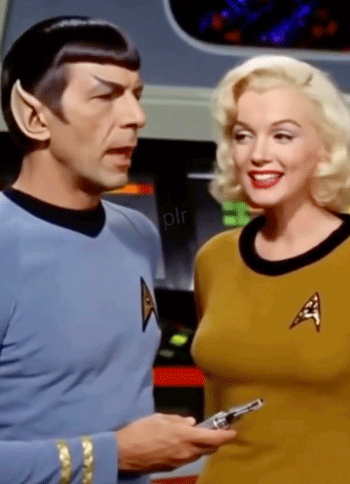Not-safe-for-work AI deepfake review
Not-safe-for-work AI deepfake review
I look at fake Pixar previews, allegedly “banned” dirty song recordings, and a disturbingly convincing Star Trek blooper. How long can reality last?
By Brad Berens
Trigger Warning (yes, I said it): Humor is subjective and always at least a bit mean. Malice, as Lady Sneerwell says in Sheridan’s School for Scandal, is “the barb that makes wit stick.”* Also, anytime there’s a new creative medium, among the first things that creators do with it is make porn and potty humor. If you’re easily offended, then click with caution this column.

I created this image using ChatGPT. I asked for a Vulcanized version of an uploaded picture of myself; it looks nothing like me.
I confess: I did find some of the following recent AI deepfakes funny, but I’m sharing them to make a point about our changing relationship with reality. As I’m said many times before in the Dispatch, one of our biggest cultural questions right now is “how do we know what is real?”
I’ll go from most obviously unreal to the most scarily real seeming.
Fake Pixar Movie Previews
This new genre has exploded across TikTok and Reels (on Instagram and Facebook). Creators have used OpenAI’s Sora or Google’s Veo 3 or Flashloop (the “you describe it and we’ll make a video of it” platforms) to create 10 second trailers of obviously fake Pixar movies, all predicated on the viewer’s experience with what real Disney/Pixar trailers look like. Under the Desk is one of several Pixar-like versions of the Clinton-Lewinsky scandal, which I’m not going to link to because for God’s sake that was nearly 30 years ago, and I admire Monica Lewinsky’s activism and resilience.
Sleep Well: The Cosby Story is dark AF, but the trailer nails the tone, and the “from the studio that brought you Inside Out” voiceover is startling. (On TikTok.) Just as dark is Kirk about the recent assassination, told as an uplifting story from the assassin’s perspective. (On Instagram.)
And there are numberless fake trailers of things like a sperm’s disappointing procreative journey when it’s a gay couple or playfully told but deeply racist memes. One that’s clever (in a Porky’s sort of way) is how the Hawk Tua girl turned into a holiday toy doll phenomenon… for dads. (On TikTok.)
These are 2025 versions of what used to be called Tijuana Bibles: pornographic eight-page cartoon strips from the 1930s to the 1950s featuring Popeye and Olive Oyl, Dick Tracy, Betty Boop, and movie stars all getting it on. (More racism: these books weren’t made in Tijuana.)
Fake “Banned” Songs from Previous Eras
“It Still Isn’t Going To Suck Itself” (YouTube) by “Rhoda Hardcok” presents itself as a banned 1970s Country song and sounds a lot like Dolly Parton. There’s also a 1940s version that sounds uncannily period.
If you do some investigatory clicking, which most people never do, you’ll find that SuS Records, the ostensible record label, presents itself on YouTube as “Bringing Back the Songs that Never Were! With the power of time travel, we were able to pluck the songs out of the timeline that were erased by the evil organization L.A.M.E.”
The songs are all cut from the same unsettling, TradWife-esque cloth: women crooning about how it’s their duty to please their men in sexually explicit ways. One was funny. Two was, “oh, that again.” But there are dozens of these on SuS Records alone, at which point it starts to seem misogynist. And there are many other such song collections that don’t declare that they are AI fakes, which also worries me.
Not every deepfake is alarming. A 1950s-style Motown Soul version of Eminem’s “Without Me” is musically interesting and explicitly declares itself AI-created. (H/T Bill Sanders.) There are many, many others.
The “WTF?” one: Mr. Spock and Lt. Monroe
On Instagram, I saw a blooper from Star Trek (the original, 1960s series) where Leonard Nimoy as Mr. Spock flubs his line and cracks up. He is clearly flustered because his scene is with Marilyn Monroe in a Starfleet uniform.
 Y’know that sound effect when the record skids to a stop? That’s what happened in my mind when I saw this. I’m a life-long Trek fan, and I thought, “how could I have missed Marilyn Monroe guest starring on Star Trek???”
Y’know that sound effect when the record skids to a stop? That’s what happened in my mind when I saw this. I’m a life-long Trek fan, and I thought, “how could I have missed Marilyn Monroe guest starring on Star Trek???”
After a minute, I looked more closely at the video and what surrounded it. The video is from GetRoastedAI, which has a huge number of short videos. A deepfake. Phew. I also remembered that Monroe died in 1962, and Star Trek didn’t premiere until 1966.
But out of that context the faux blooper isn’t just taking advantage of the AI plausibility loophole: it is completely, shockingly convincing. Even though I immediately talked myself out of its real-ness (or “unbelieved it” in Dan Gilbert’s term), I still have, and forever will have, a memory of Marilyn Monroe on Star Trek.
Had I not been a Star Trek fan and looked closely, I would have accepted that the blooper was real for the rest of my life. The reason this frightens me is that we did not evolve to look closely most of the time. We thin slice, jump to conclusions, and use Kahneman’s System 1 as much as we can.
There’s a relevant moment in Roxanne, one my favorite movies (Steve Martin as Cyrano, from 1987). Roxanne has just figured out that handsome Chris hadn’t written the love letters that had so caught her fancy; instead, they came from big-nosed CB.
CB says, “you could have figured it out: the signatures don’t even match the handwriting.”
Roxanne replies, “When you’re getting love letters you don’t compare the signature to the handwriting!”
She’s right: love letters inspire a different sort of scrutiny than, “did that guy really write this?”
Earlier, I mentioned that one of our biggest cultural questions is “how do we know what is real?”
There’s another question that’s starting to nag at me: even if we suspect that that something isn’t real, will we care?
__________

Brad Berens is the Center’s strategic advisor and a senior research fellow. He is principal at Big Digital Idea Consulting. You can learn more about Brad at www.bradberens.com, follow him on Blue Sky and/or LinkedIn, and subscribe to his weekly newsletter (only some of his columns are syndicated here).
* The full Sheridan quote: “Pshaw! There’s no possibility of being witty without a little ill nature: the malice of a good thing is the barb that makes it stick.”
See all columns from the Center.
November 5, 2025

